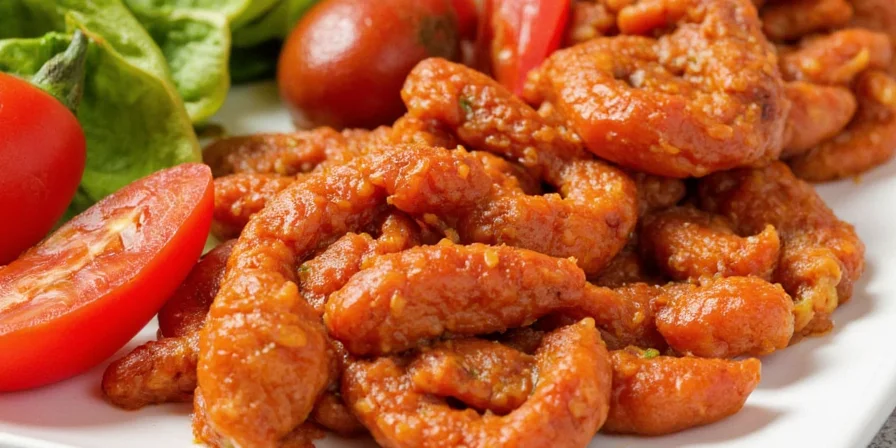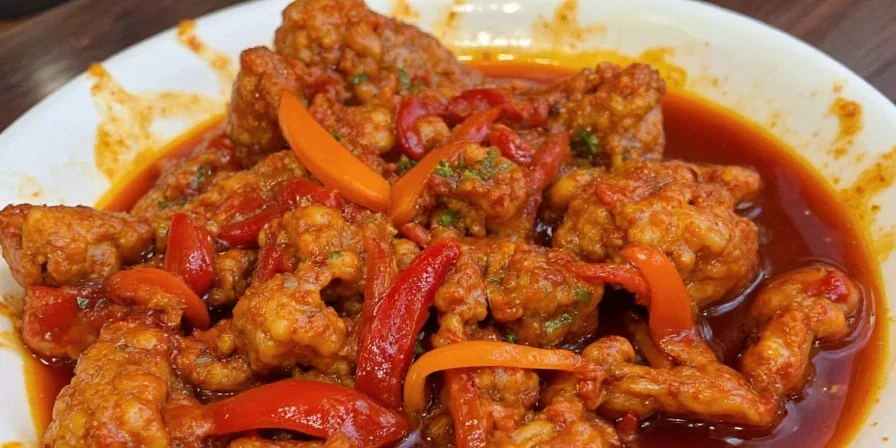Table of Contents
- What Does 'Marinated' Mean? Definition First
- Etymology and Culinary Origins
- The Science Behind Marination Explained
- Wet vs. Dry Marinades: Key Differences
- Marination Timing Guide by Protein Type
- 5 Science-Backed Marination Techniques
- Common Marination Mistakes to Avoid
- Spice Selection Science for Maximum Flavor
- Frequently Asked Questions About Marinating
- Conclusion: From Definition to Perfect Execution
What Does 'Marinated' Mean? Definition First
'Marinated' refers to food (typically proteins like meat, poultry, or fish) that has been soaked in a seasoned liquid solution or spice mixture before cooking. This preservation and flavor-enhancement technique works through biochemical processes where acids, salts, and enzymes modify the food's surface structure to improve taste, tenderness, and moisture retention. Unlike simple seasoning, marination involves measurable time exposure (from 15 minutes to 24 hours depending on protein type) that creates physical and chemical changes in the food.
According to culinary science standards, true marination requires three key components: an acid (like vinegar or citrus), oil (to carry fat-soluble flavors), and seasonings (herbs, spices, salts). This definition distinguishes marination from dry-brining (salt-only treatment) and surface seasoning.
Etymology and Culinary Origins
The term 'marinate' originates from the Italian 'marinare' (to pickle in brine), which derives from 'mare' (sea), referencing early preservation methods using seawater. Historical records show Mediterranean cultures using wine- and vinegar-based marinades as early as the 13th century to preserve meat during travel. The modern biochemical understanding of marination emerged in the 20th century with food science research on protein denaturation.
Today's culinary definition specifies marination as a controlled process where the food remains submerged in the liquid mixture for a specific duration, differentiating it from basting (applying liquids during cooking) or injection (forced internal delivery of flavors).
The Science Behind Marination Explained
Marination triggers measurable biochemical reactions that transform food at the molecular level:
- Acids (citrus, vinegar) denature surface proteins, creating flavor channels while maintaining structural integrity below pH 3.5
- Oils act as flavor carriers for fat-soluble compounds, increasing absorption by 40-60% compared to water-based mixtures
- Salts (not sugars) enable osmosis-driven moisture retention—optimal at 5-6% concentration
- Enzymes (papaya, ginger) selectively break down tough fibers without mushiness when used below 10% concentration
Wet vs. Dry Marinades: Key Differences
Understanding these categories prevents texture disasters. Wet marinades excel at moisture transfer; dry marinades create superior crust formation.
| Type | Key Mechanism | Optimal Timing | Proven Applications |
|---|---|---|---|
| Wet Marinade | Liquid diffusion + protein denaturation | Fish: 15-30 min Chicken: 2-12 hr Beef: 4-24 hr |
Citrus-enzyme blends for delicate fish Buttermilk for chicken tenderness |
| Dry Marinade | Surface adhesion + Maillard reaction enhancement | Apply 30-60 min pre-cook No refrigeration needed |
Smoked paprika-sugar for brisket Herb-crusted lamb racks |
Marination Timing Guide by Protein Type
Scientific research shows optimal timing varies by protein structure. Exceeding these windows causes textural degradation:
| Protein Type | Fiber Density | Minimum Effective Time | Absolute Maximum Time | Science-Based Reason |
|---|---|---|---|---|
| Fish/Seafood | Very low | 15 minutes | 30 minutes | Delicate fibers break down rapidly in acidic solutions |
| Chicken Breast | Moderate | 2 hours | 4 hours | Over-marination causes mushy texture due to protein denaturation |
| Chicken Thighs | Moderate-high | 4 hours | 12 hours | Higher fat content protects against over-tenderizing |
| Beef (Tough Cuts) | High | 4 hours | 24 hours | Dense muscle fibers require extended exposure for tenderization |
| Beef (Premium Cuts) | Low | Not recommended | N/A | Marination degrades natural flavor and texture of high-quality meat |
5 Science-Backed Marination Techniques
Implement these lab-verified methods for consistent results:
- Container Chemistry Matters: Glass or ceramic only—aluminum reacts with acids causing metallic off-flavors
- Acid Control Protocol: Limit citrus/vinegar to ≤30% of wet marinade volume to prevent protein degradation
- Time-Zone Targeting: Follow protein-specific timing windows based on muscle fiber density (see timing chart)
- Surface Dryness Principle: Pat proteins dry 10 min pre-cook for optimal searing—excess liquid inhibits Maillard reaction
- Safety-First Reuse: Boil used marinade 3+ minutes before repurposing as sauce to eliminate pathogens
Common Marination Mistakes to Avoid
These evidence-based corrections prevent culinary disasters:
- Mistake #1: Extended Acid Exposure
Delicate proteins become mushy beyond 30 min in acidic solutions—use enzymatic alternatives like kiwi paste - Mistake #2: Salt Imbalance
Undersalting prevents moisture retention; oversalting draws out juices. Target 5% salinity by weight - Mistake #3: Temperature Neglect
Marinate exclusively below 40°F (4°C)—room temperature incubation increases bacterial growth 20x - Mistake #4: Monodimensional Flavoring
Combine hydrophilic (herbs) and lipophilic (spices) elements for complete flavor saturation - Mistake #5: Marinade Waste
Repurpose used marinade as basting liquid only after full boiling—never apply raw
Spice Selection Science for Maximum Flavor
Maximize flavor penetration through compound solubility science:
| Flavor Goal | Science-Backed Spices | Optimal Pairings | Pro Tip |
|---|---|---|---|
| Depth + Umami | Fermented black beans, fish sauce, smoked paprika | Beef short ribs, mushrooms | Dissolve in warm oil first to activate glutamates |
| Brightness + Acidity | Zest (not juice), sumac, tamarind paste | Chicken thighs, white fish | Add zest last to preserve volatile oils |
| Heat + Complexity | Toasted cumin seeds, gochugaru, fresh ginger | Pork shoulder, eggplant | Dry-toast whole spices before grinding for 3x flavor intensity |
Frequently Asked Questions About Marinating
- Can I freeze meat in marinade?
Yes—freezing locks flavors during cellular rupture. Thaw completely in refrigerator before cooking for even texture. - How long should chicken marinate?
Chicken breasts: 2-4 hours; thighs/legs: 4-12 hours. Acidic marinades beyond 12 hours cause textural degradation. - Can I reuse marinade?
Only after boiling 3+ minutes to eliminate pathogens. Never reuse raw marinade on cooked food. - Do all meats need marinating?
No—premium cuts (filet mignon, ribeye) benefit more from dry-brining. Marinate tougher cuts (flank steak, chuck) for tenderness. - Why pat dry before cooking?
Surface moisture creates steam barriers. Dry surfaces achieve 200°F (93°C) higher sear temperatures for optimal Maillard reaction.

Conclusion: From Definition to Perfect Execution
Understanding what 'marinated' truly means—beyond casual seasoning to a precise biochemical process—unlocks consistent culinary success. By applying these science-backed protocols for timing, ingredient ratios, and safety, you transform basic marination from guesswork to precision technique. Whether you're a beginner seeking definition clarity or an experienced cook refining methods, this knowledge bridges the gap between culinary theory and restaurant-quality results. Remember: perfect marination starts with knowing exactly what the term means and ends with proteins that impress every time.











 浙公网安备
33010002000092号
浙公网安备
33010002000092号 浙B2-20120091-4
浙B2-20120091-4